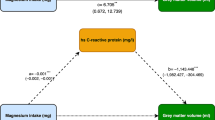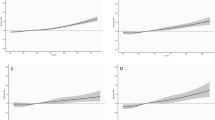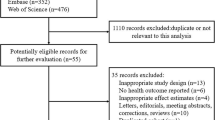Abstract
Purpose
This study evaluated the association between coffee consumption and serum lipid profile in the Brazilian Longitudinal Study of Adult Health (ELSA-Brasil).
Methods
This is a cross-sectional study on baseline data from participants of the cohort ELSA-Brasil. Only participants of São Paulo Research Center who underwent a nuclear magnetic resonance (NMR) spectroscopy examination of lipid profile were included (N = 4736). Coffee intake was categorized into four categories (cups/day, in reference cup size of 50 mL, which is the household measure adopted in Brazil): never/almost never, ≤ 1, 1–3, and > 3. Serum lipid profile [i.e., Total Cholesterol (TC), Total Triglycerides (TG), Very Low-Density Lipoprotein-cholesterol (VLDL-c), Low-Density Lipoprotein-cholesterol (LDL-c), High-Density Lipoprotein-cholesterol (HDL-c), Triglyceride-rich Lipoprotein Particles (TRLP) and subfractions particles] was analyzed. To estimate the effect of coffee consumption on serum lipid profile, multivariate Generalized Linear Models were performed.
Results
Compared to participants who never or almost never drink coffee, individuals who consumed more than 3 cups/day showed an increase in concentrations of TC (β: 4.13; 95% CI 0.81, 7.45), TG (β: 9.53; 95% CI 1.65, 17.42), VLDL-c (β: 1.90; 95% CI 0.38, 3.42), TRLP (β: 8.42; 95% CI 1.24, 15.60), and Very Small-TRLP and Medium-TRLP subfractions (β: 7.36; 95% CI 0.21, 14.51; β: 2.53; 95% CI 0.89, 4.16, respectively), but not with HDL-c and LDL-c. Among individuals with low (≤ 1 cup/day) and moderate (1–3 cups/day) coffee consumption, no significant associations with lipids was observed.
Conclusion
High coffee consumption (more than 3 cups per day) was associated with an increase in serum lipids, namely TC, TG, VLDL-c, and TRL particles, highlighting the importance of a moderate consumption of this beverage.

Similar content being viewed by others
References
Mattiuzzi C, Sanchis-Gomar F, Lippi G (2020) Worldwide burden of LDL cholesterol: implications in cardiovascular disease. Nutr Metab Cardiovasc Dis 30(2):241–244
Karam I, Ma N, Liu XW, Li SH, Kong XJ, Li JY et al (2015) Regulation effect of Aspirin Eugenol Ester on blood lipids in Wistar rats with hyperlipidemia. BMC Vet Res 11(1):217
Rouhani MH, Rashidi-Pourfard N, Salehi-Abargouei A, Karimi M, Haghighatdoost F (2017) Effects of egg consumption on blood lipids: a systematic review and meta-analysis of randomized clinical trials. J Am Coll Nutr. https://doi.org/10.1080/07315724.2017.1366878
Ginsberg HN (1997) Is hypertriglyceridemia a risk factor for atherosclerotic cardiovascular disease? A simple question with a complicated answer. Ann Intern Med 126:912–914
Katan MB, Grundy SM, Jones P, Law M, Miettinen T, Paoletti R (2003) Efficacy and safety of plant stanols and sterols in the management of blood cholesterol levels. Mayo Clin Proc 78:965–978
DiNicolantonio JJ, Harcombe Z, O’Keefe JH (2016) Problems with the 2015 dietary guidelines for Americans: an alternative. Mo Med 113:93–97
Godos J, Pluchinotta FR, Marventano S, Buscemi S, Li Volti G, Galvano F, Grosso G (2014) Coffee components and cardiovascular risk: beneficial and detrimental effects. Int J Food Sci Nutr 65:925–936
Natella F, Nardini M, Belelli F, Scaccini C (2007) Coffee drinking induces incorporation of phenolic acids into LDL and increases the resistance of LDL to ex vivo oxidation in humans. Am J Clin Nutr 86:604–609
Fuentes E, Palomo I (2014) Mechanisms of endothelial cell protection by hydroxycinnamic acids. Vasc Pharmacol 63:155–161
Rustan AC, Halvorsen B, Huggett AC, Ranheim T, Drevon CA (1997) Effect of coffee lipids (cafestol and kahweol) on regulation of cholesterol metabolism in HepG2 cells. Arterioscler Thromb Vasc Biol 17:2140–2149
Du Y, Lv Y, Zha W, Hong X, Luo Q (2020) Effect of coffee consumption on dyslipidemia: a meta-analysis of randomized controlled trials. Nutr Metab Cardiovasc Dis 30(12):2159–2170
Kempf K, Herder C, Erlund I, Kolb H, Martin S, Carstensen M et al (2010) Effects of coffee consumption on subclinical inflammation and other risk factors for type 2 diabetes: a clinical trial. Am J Clin Nutr 4:950–957
Grosso G, Stepaniak U, Micek A, Topor-Mądry R, Pikhart H, Szafraniec K et al (2015) Association of daily coffee and tea consumption and metabolic syndrome: results from the Polish arm of the HAPIEE study. Eur J Nutr 54(7):1129–1137
Agudelo-Ochoa GM, Pulgarin-Zapata IC, Velasquez-Rodriguez CM, Duque-Ramirez M, Naranjo-Cano M, Quintero-Ortiz MM et al (2016) Coffee consumption increases the antioxidant capacity of plasma and has no effect on the lipid profile or vascular function in healthy adults in a randomized controlled trial. J Nutr. https://doi.org/10.3945/jn.115.224774
Miranda AM, Steluti J, Fisberg RM, Marchioni DM (2017) Association between coffee consumption and its polyphenols with cardiovascular risk factors: a population-based study. Nutrients 9(3):276
Roshan H, Nikpayam O, Sedaghat M, Sohrab G (2018) Effects of green coffee extract supplementation on anthropometric indices, glycaemic control, blood pressure, lipid profile, insulin resistance and appetite in patients with the metabolic syndrome: a randomised clinical trial. Br J Nutr. https://doi.org/10.1017/S0007114517003439
Kalel A, Almutairi AH, Alyahiwi AM, Jalaluddin AA, Aljohani MA, Aloufi RM, Almatrafi RM (2020) Effect of coffee consumption on serum lipid profile among adult population in Madinah, Saudi Arabia. IJMDC 4(10):1527–1532
Corrêa TA, Rogero MM, Mioto BM, Tarasoutchi D, Tuda VL, César LA, Torres EA (2013) Paper-filtered coffee increases cholesterol and inflammation biomarkers independent of roasting degree: a clinical trial. Nutrition 29:977–981
Otvos J (1999) Measurement of triglyceride-rich lipoproteins by nuclear magnetic resonance spectroscopy. Clin Cardiol 22(6 Suppl):II21–II27
Aquino EM, Barreto SM, Bensenor IM, Carvalho MS, Chor D, Duncan BB, Lotufo PA, Mill JG, Molina Mdel C, Mota EL, Passos VM, Schmidt MI, Szklo M (2012) Brazilian longitudinal Study of Adult Health (ELSA-Brasil): objectives and design. Am J Epidemiol 175(4):315–324
Bensenor IM, Griep RH, Pinto KA, Faria CP, Felisbino-Mendes M, Caetano EI, Albuquerque LS, Schmidt MI (2013) Routines of organization of clinical tests and interviews in the ELSA-Brasil investigation center. Rev Saud Publica 47:37–47
Schmidt MI, Duncan BB, Mill JG, Lotufo PA, Chor D, Barreto SM, Aquino EM, Passos VM, Matos SM, del Molina MC, Carvalho MS, Bensenor IM (2015) Cohort profile: longitudinal study of adult health (ELSA-Brasil). Int J Epidemiol 44:68–75
del Molina CM, Bensenor IM, de Cardoso LO, Velasquez-Melendez G, Drehmer M, Pereira SS, Faria CPF, Melere C, Manato L, Gomes ALC, Fonseca MJ, Sichieri R (2013) Reproducibility and relative validity of the Food Frequency Questionnaire used in the ELSA-Brasil. Cad Saude Publica 29:379–389
Willett W (1998) Nutritional epidemiology. Oxford Univ Press, Oxford, pp 768–772
Jeyarajah EJ, Cromwell WC, Otvos JD (2006) Lipoprotein particle analysis by nuclear magnetic resonance spectroscopy. Clin Lab Med 26(4):847–870
The IPAQ group (2014) International Physical Activity Questionnaire. Internet: http://www.ipaq.ki.se.
Chor D, Pinho Ribeiro AL, Sá Carvalho M, Duncan BB, Andrade Lotufo P, Araújo Nobre A, Aquino EM, Schmidt MI, Griep RH, Molina Mdel C, Barreto SM, Passos VM, Benseñor IJ, Matos SM, Mill JG (2015) Prevalence, awareness, treatment and influence of socioeconomic variables on control of high blood pressure: results of the ELSA-Brasil study. PLoS ONE 10:e0127382
WHO (2006) Definition and diagnosis of diabetes mellitus and intermediate hyperglycaemia. World Health Organization, Geneva
WHO (2011) Use of glycated haemoglobin (HbA1c) in the diagnosis of diabetes mellitus. World Health Organization, Geneva
Santos IS, Bittencourt MS, Rocco PT, Pereira AC, Barreto SM, Brunoni AR et al (2016) Relation of anxiety and depressive symptoms to coronary artery calcium (from the ELSA-Brasil Baseline Data). Am J Cardiol 118(2):183–187
Karabudak E, Türközü D, Köksal E (2015) Association between coffee consumption and serum lipid profile. Exp Ther Med 9(5):1841–1846
O’Keefe JH, Bhatti SK, Patil HR, Dinicolantonio JJ, Lucan SC, Lavie CJ (2013) Effects of habitual coffee consumption on cardiometabolic disease, cardiovascular health, and all-cause mortality. J Am Coll Cardiol 62(12):1043–1051
Ranheim T, Halvorsen B (2005) Coffee consumption and human health—beneficial or detrimental?—mechanisms for effects of coffee consumption on different risk factors for cardiovascular disease and type 2 diabetes mellitus. Mol Nutr Food Res 49:274–284
Cai L, Ma D, Zhang Y, Liu Z, Wang P (2012) The effect of coffee consumption on serum lipids: a meta-analysis of randomized controlled trials. Eur J Clin Nutr 66:872–877
van Dusseldorp M, Katan MB, van Vliet T, Demacker PN, Stalenhoef AF (1991) Cholesterol-raising factor from boiled coffee does not pass a paper filter. Arterioscler Thromb 11(3):586–593
Miyake Y, Kono S, Nishiwaki M, Hamada H, Nishikawa H, Koga H et al (1999) Relationship of coffee consumption with serum lipids and lipoproteins in Japanese men. Ann Epidemiol 9:121–126
Brown CA, Bolton-Smith C, Woodward M, Tunstall-Pedoe H (1993) Coffee and tea consumption and the prevalence of coronary heart disease in men and women: results from the scottish heart health study. J Epidemiol Community Health 47(3):171–175
Silvério ASD, Pereira RGFA, Lima AR, de Araújo PFB, Rodrigues MR, Baldissera L Jr et al (2013) The effects of the decaffeination of coffee samples on platelet aggregation in hyperlipidemic rats. Plant Foods Hum Nutr (Dordr) 68(3):268–273
Aro A, Teirilä J, Gref CG (1990) Dose-dependent effect on serum cholesterol and apoprotein B concentrations by consumption of boiled, non-filtered coffee. Atherosclerosis 83:257–261
Urgert R, Katan MB (1996) The cholesterol-raising factor from coffee beans. J R Soc Med 89(11):618–623
Thelle DS, Strandhagen E (2005) Coffee and disease: an overview with main emphasis on blood lipids and homocysteine. Scand J Food Nutr 49:50–61
Cano-Marquina A, Tarín JJ, Cano A (2013) The impact of coffee on health. Maturitas 75(1):7–21
Lee C (2000) Antioxidant ability of caffeine and its metabolites based on the study of oxygen radical absorbing capacity and inhibition of LDL peroxidation. Clin Chim Acta 295(1):141–154
Richelle M, Tavazzi I, Offord E (2001) Comparison of the antioxidant activity of commonly consumed polyphenolic beverages (coffee, cocoa, and tea) prepared per cup serving. J Agric Food Chem 49:3438–3442
Nardini M, Belelli F, Scaccini C (2007) Coffee drinking induces incorporation of phenolic acids into LDL and increases the resistance of LDL to ex vivo oxidation in humans. Am J Clin Nutr 86:604–609
Cartron E, Carbonneau MA, Fouret G, Descomps B, Leger CL (2001) Specific antioxidant activity of caffeoyl derivatives and other natural phenolic compounds: LDL protection against oxidation and decrease in the proinflammatory lysophosphatidylcholine production. J Nat Prod 64:480–486
Yukawa GS, Mune M, Otani H, Tone Y, Liang XM, Iwahashi H et al (2004) Effects of coffee consumption on oxidative susceptibility of low density lipoproteins and serum lipid levels in humans. Biochem (Mosc). 69(1):70–74
Meng S, Cao J, Feng Q, Peng J, Hu Y (2013) Roles of chlorogenic acid on regulating glucose and lipids metabolism: a review. Evid Based Complement Alternat Med. https://doi.org/10.1155/2013/801457
Ong KW, Hsu A, Tan BKH (2013) Anti-diabetic and anti-lipidemic effects of chlorogenic acid are mediated by ampk activation. Biochem Pharmacol 85(9):1341–1351
Nilsson LM, Wennberg M, Lindahl B, Eliasson M, Guelpen BV (2009) Consumption of filtered and boiled coffee and the risk of first acute myocardial infarction; a nested case/referent study. Nutr Metabol Cardiovasc Dis 20(7):527–535
Post SM (2000) Cafestol increases serum cholesterol levels in apolipoprotein E^*3-leiden transgenic mice by suppression of bile acid synthesis. Arterioscler Thromb Vasc Biol 20(6):1551–1556
Cheung RJ, Gupta EK, Ito MK (2005) Acute coffee ingestion does not affect LDL cholesterol level. Ann Pharmacother 39(7–8):1209–1213
Acknowledgements
We would also like to acknowledge the participation of the 15,105 individuals recruited for this study without which this study and those based on the ELSA-Brasil cohort would not have been possible. Furthermore, we also would like to express our gratitude to the funding agencies for the financial support.
Funding
The ELSA-Brasil baseline study was supported by the Brazilian Ministry of Health (Science and Technology Department) and the Brazilian Ministry of Science and Technology and National Research Council (grant numbers 01 06 0010.00 RS, 01 06 0212.00 BA, 01 06 0300.00 ES, 01 06 0278.00 MG, 01 06 0115.00 SP, and 01 06 0071.00 RJ). The research center of São Paulo was also supported by Sao Paulo Research Foundation (FAPESP) (grant number 2011/12256–4). Andreia Machado Miranda received post-doctoral scholarship from the São Paulo Research Foundation (FAPESP) (grant number 2018/04116–7). All funding agencies had no role in the study design, data collection, analysis, decision to publish, or preparation of the manuscript.
Author information
Authors and Affiliations
Contributions
Andreia Machado Miranda: conceptualization, methodology, formal analysis, writing—original draft; Alessandra C Goulart, Giuliano Generoso, Márcio S Bittencourt, Raul Dias Santos, Peter Toth, Stevens Jones: writing—reviewing and editing; Isabela M Benseñor, Paulo A Lotufo: project administration, writing—reviewing and editing; Dirce Maria Marchioni: conceptualization, methodology, supervision, writing—reviewing and editing. All authors read and approved the final version of the manuscript.
Corresponding author
Ethics declarations
Conflict of interest
The authors declare that they have no conflicts of interest to disclose.
Rights and permissions
About this article
Cite this article
Miranda, A.M., Goulart, A.C., Generoso, G. et al. Association between coffee consumption with serum lipid profile in ELSA-Brasil study: a metabolomic approach. Eur J Nutr 61, 4205–4214 (2022). https://doi.org/10.1007/s00394-022-02946-4
Received:
Accepted:
Published:
Issue Date:
DOI: https://doi.org/10.1007/s00394-022-02946-4




